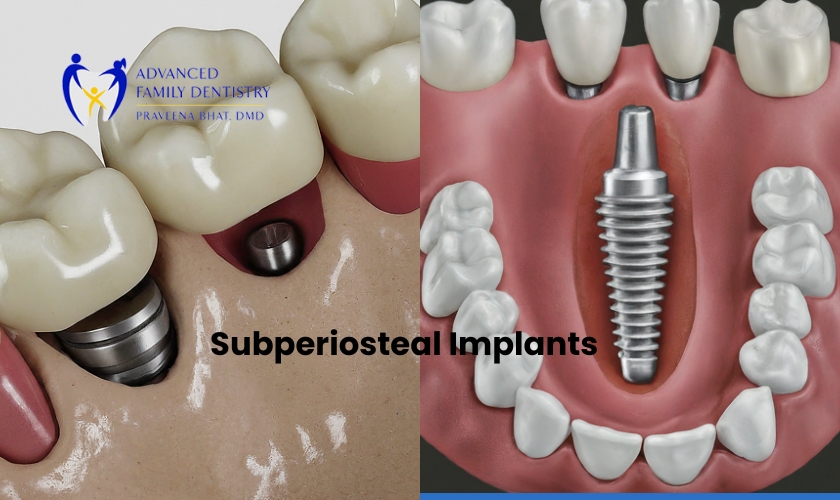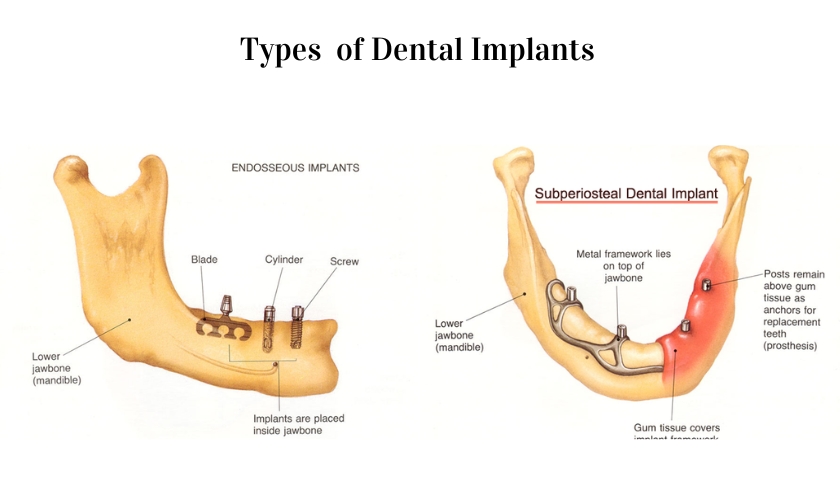Top Family, Cosmetic and Implant Center In 537 Amherst St, Nashua, NH 03063
What Are The 3 Types of Dental Implants?
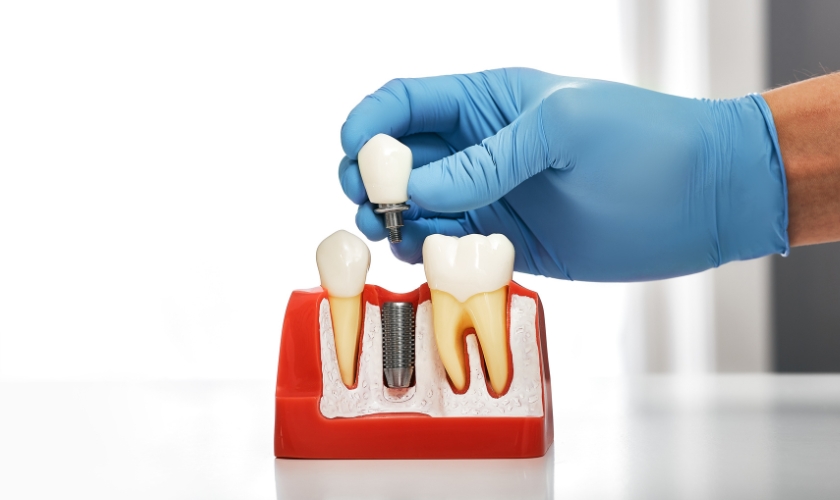
Are you missing a tooth or struggling with a denture that just won’t stay put? Perhaps dental implants are the answer you’ve been looking for! These incredible advancements in modern dentistry can restore your smile and give you back the confidence to show it off. But did you know that there are actually three different types of dental implants? In this blog post, we’ll explore each type and delve into their unique benefits. So whether you’re looking for a dentist in Nashua or simply curious about dental implant options, keep reading to learn more!
The 3 Types of Dental Implants
When it comes to dental implants, there are three main types that can be used: endosteal implants, subperiosteal implants, and zygomatic implants. Each type has its own unique characteristics and procedures.
1. Endosteal Dental Implants
2. Subperiosteal Dental Implants
3: Zygomatic Dental Implants
1. Endosteal Dental Implants
When considering dental implants, one prevalent type to explore is the endosteal implant, which is widely recognized and favored in dental procedures.
Essentially, endosteal implants act as roots for artificial teeth and involve small screws or cylinders crafted from biocompatible materials, typically titanium. The two-stage placement procedure begins with an incision in the gum tissue and the drilling of holes in the jawbone to carefully insert the implant.
Subsequently, a healing phase follows, allowing osseointegration, the fusion of bone with the implant surface, and the establishment of a robust foundation for new teeth. Once the gums heal and osseointegration is successful, abutments can be attached to the implants, supporting customized crowns or bridges.
Endosteal implants prove reliable for those with ample jawbone density seeking a durable tooth replacement solution. However, it’s crucial to seek guidance from a specialized dentist in Nashua for informed decisions on the most suitable implant type.
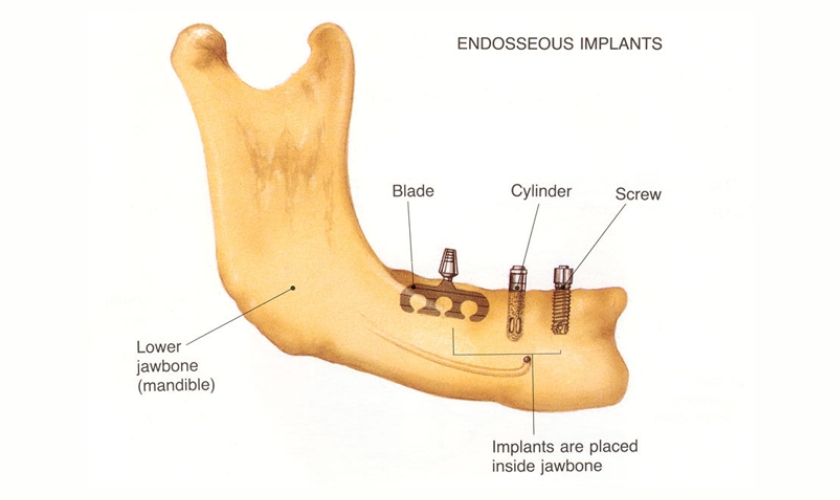
Description and Procedure
Endosteal implants are one of the three types of dental implants commonly used to replace missing teeth. These implants are made up of titanium and resemble small screws or cylinders. The procedure for placing these implants involves surgically inserting them into the jawbone, where they act as artificial tooth roots
During the surgery, a local anesthetic is administered to numb the area. Then, an incision is made in the gum tissue to expose the jawbone. Next, small holes are drilled in the bone to create space for implant placement. The implants are carefully positioned and secured in place using special tools.
Once placed, a healing period is necessary to allow osseointegration; this is when the surrounding bone fuses with the implant surface, providing stability and support. After healing, another minor surgery may be performed to attach abutments—connecting pieces that protrude above the gum line—to which prosthetic teeth can be affixed.
Endosteal implants offer several advantages over other options due to their stability and durability. They provide excellent support for replacement teeth while preserving facial structure by stimulating natural bone growth.
Endosteal implants have proven successful in restoring smiles and improving oral functionality for many patients. If you’re considering dental implants as a solution for missing teeth, consult with your dentist in Nashua about whether endosteal implants may be suitable for you!
2. Subperiosteal Implants
Subperiosteal implants offer a viable solution for individuals who may not have enough bone height or density to support traditional endosteal implants. These implants are placed on top of the jawbone, beneath the gum tissue.
The procedure begins by taking precise impressions of the jawbone using advanced imaging techniques. This allows for the creation of custom-made implant frameworks that will fit perfectly over the contours of your jawbone.
After preparing the framework, surgeons place it onto your jawbone using small metal posts that protrude through your gums. They then carefully reposition the gum tissue around these posts to ensure proper healing and stability.
After a healing period, which usually lasts several weeks, the dentist can attach artificial teeth or bridges to the implant framework. This provides patients with a secure and natural-looking replacement for their missing teeth.
Subperiosteal implants offer numerous benefits, including improved comfort, enhanced chewing ability, and increased self-confidence. However, it’s important to consult with an experienced dentist in Nashua to determine if this type of implant is suitable for you.
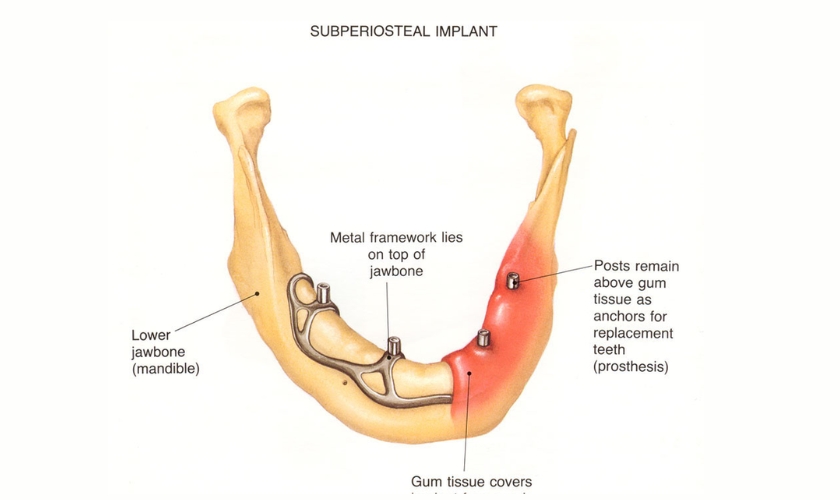
Description and Procedure
Subperiosteal implants offer an alternative option for patients who may not have sufficient bone structure to support traditional endosteal implants. They place these on top of the bone but beneath the gum tissue, rather than inserting them into the jawbone.
In this procedure, the dentist takes impressions or 3D scans to craft a customized implant framework fitting snugly against your natural jawbone contours. The dentist then positions this framework beneath your gums so that it can heal and fuse securely in place.
Skilled dentists in Nashua offer zygomatic implants as an innovative solution when traditional areas like the upper jaws lack sufficient bone density. These specialized implants anchor themselves onto cheekbones called zygoma instead of relying solely on existing jawbones.
To perform this procedure effectively, it requires extensive training and experience due to its complexity compared to other types of dental implant procedures available today. However,the results can be truly transformative, as they provide stability even when conventional options might not be feasible.
These three types of dental implants- Endosteal Implants, Subperiosteal Implants,and Zygomatic Implants – each offer unique solutions for patients with varying oral health needs. Whether you require a traditional
3. Zygomatic Implants
Zygomatic implants are a specialized type of dental implant that provide a solution for patients with severe bone loss in the upper jaw. Implants, unlike placing traditional implants directly into the jawbone, anchor to the cheekbones, providing stability for dental restorations.
The procedure for zygomatic implants involves attaching longer implant posts to the cheekbones instead of drilling into the jawbone. This is beneficial for individuals who have experienced significant bone loss or have undergone multiple failed attempts at traditional implant placement. By utilizing the cheekbones as an alternative anchoring point, patients can still enjoy the benefits of dental restoration even if they lack sufficient bone density in their upper jaws.
For those seeking full arch replacement or exhausting all other options, zygomatic implants provide a viable solution. While this procedure may require more complex planning and expertise from your dentist, it provides hope and improved quality of life for individuals facing extensive tooth loss and compromised oral health.
Talk to your dentist whether zygomatic implants might be suitable for you! They will be able to assess your specific needs and determine if this innovative treatment option is right for restoring your smile’s functionality and aesthetics.
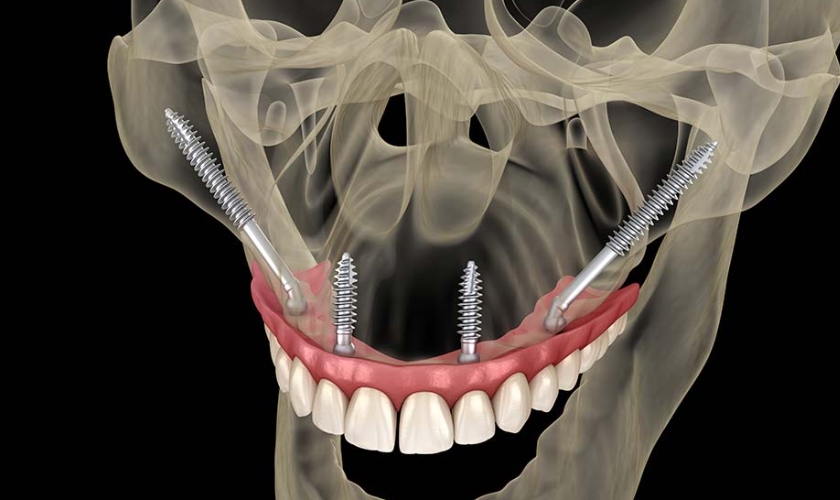
Description and Procedure
To summarize, dental implants are a revolutionary solution for individuals who have missing teeth. They not only restore the functionality of the mouth but also enhance one’s smile and overall oral health. With advancements in dentistry, there are now three main types of dental implants: endosteal implants, subperiosteal implants, and zygomatic implants.
Zygomatic implants provide an effective solution for patients with severe bone loss in their upper jaws. Instead of anchoring into the jawbone itself, they utilize longer posts that attach to the cheekbones.
Each type of dental implant comes with its own unique features and benefits. The choice depends on factors such as individual needs, preferences, and oral health conditions.
Considering dental implants in Nashua? Consult a qualified dentist for personalized advice and guidance on the best type. Remember that proper care after getting dental implants is essential for long-term success. Ensure lasting results by maintaining oral hygiene through regular brushing, flossing, and routine dentist visits.
Modern dentistry techniques and skilled professionals at Advanced Family Dentistry Nashua make achieving a beautiful smile effortless!
So don’t let missing teeth hold you back any longer; explore the possibilities of dental implant treatment today! Schedule an appointment with our experienced team at Advanced Family Dentistry Nashua to discuss which type of dental implant is right for you. Start your journey towards a healthier, more confident smile now.


